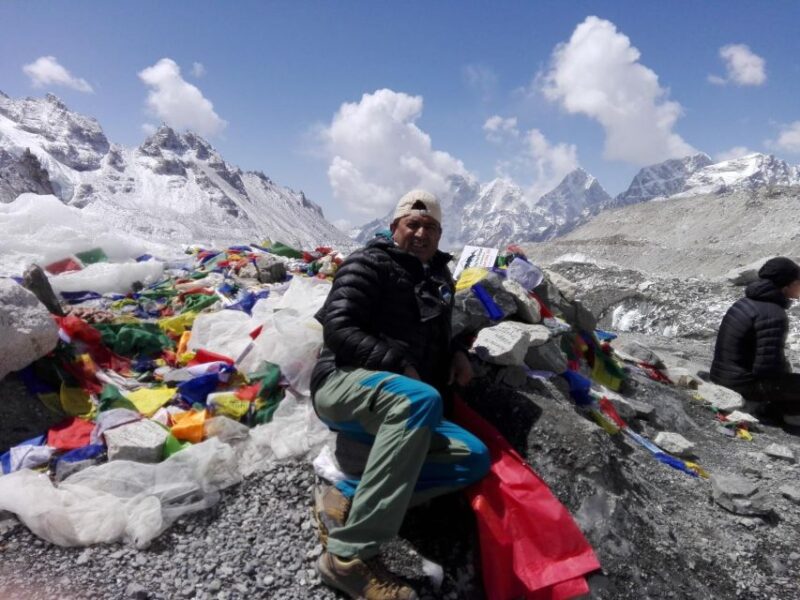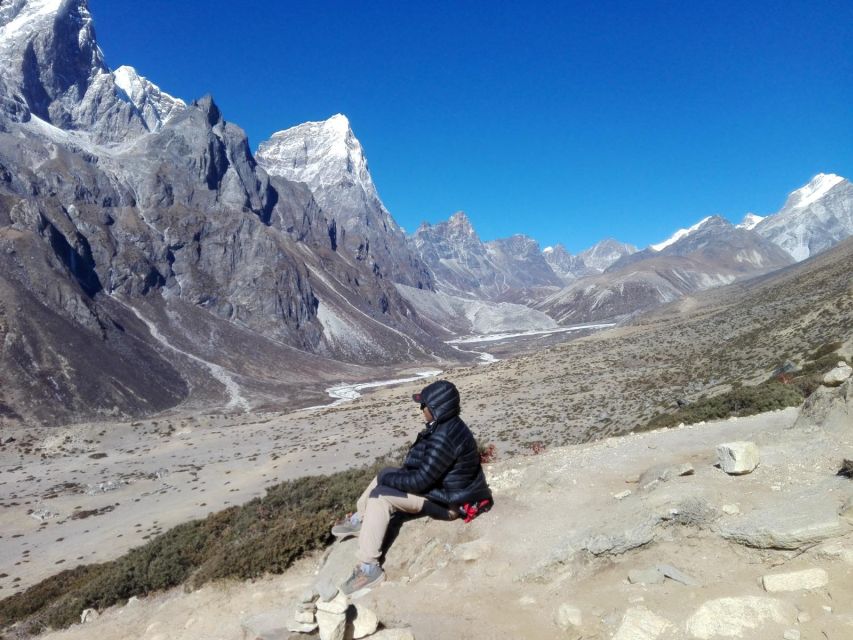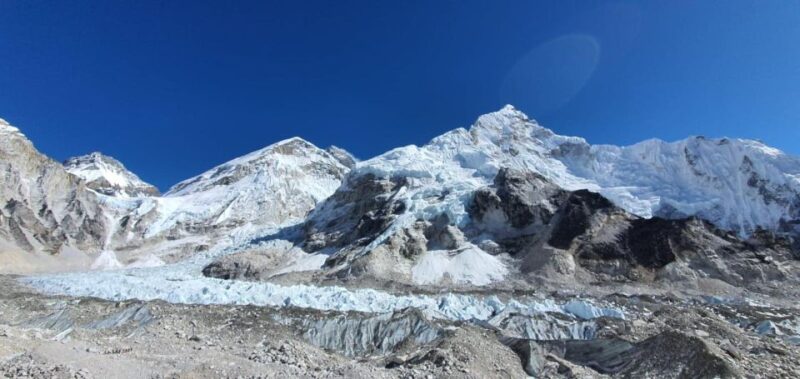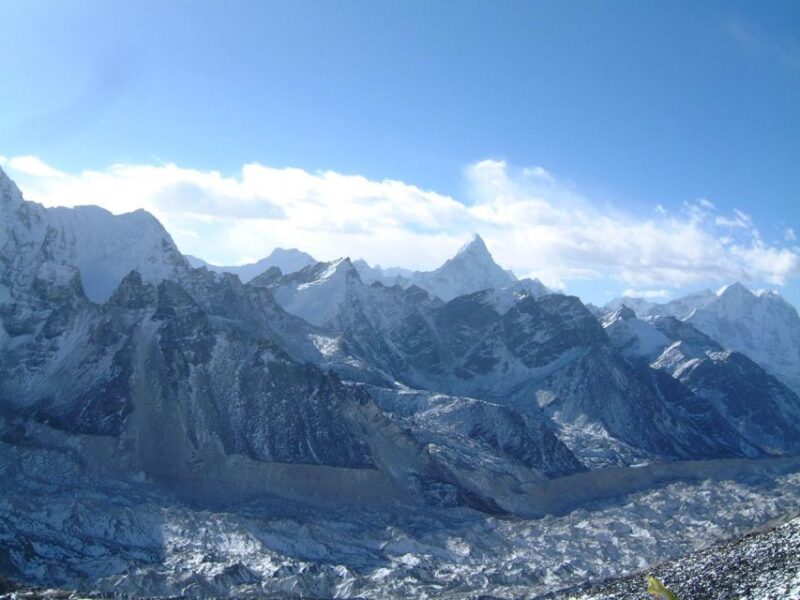The Everest Base Camp Trek is a renowned hiking adventure that draws outdoor enthusiasts from around the world. Trekkers can expect to be captivated by the awe-inspiring grandeur of the Himalayas, immersed in the vibrant Sherpa culture, and challenged by the physical demands of high-altitude trekking. With proper preparation and a guide’s expertise, this 12-16 day journey offers an unforgettable opportunity to witness the majestic landscapes surrounding the world’s highest peak. But beneath the allure of this iconic trek lies a more profound experience – one that invites trekkers to push their limits and discover the resilience within.
Key Points

- Everest Base Camp Trek is a 12-16 day trek that offers breathtaking Himalayan views, culture in Sherpa villages, and a sense of accomplishment in reaching the base camp.
- The trek is priced at $1,780.83 per person and includes experienced guides, porters, permits, and accommodations, with a free cancellation policy up to 24 hours in advance.
- The trek begins in Kathmandu and involves a combination of walking, hiking, and helicopter flights, with opportunities to visit ancient monasteries and observe diverse flora and fauna.
- Preparation for the trek includes physical conditioning, obtaining necessary permits, and packing appropriate gear, as well as obtaining comprehensive travel and medical insurance.
- Awareness of altitude sickness risks and proper acclimatization through gradual ascent and rest days is essential for the successful and safe completion of the trek.
Overview and Pricing

The Everest Base Camp Trek offers an immersive experience in the Himalayas, priced at $1,780.83 per person. This trek typically spans 12-16 days, with daily activities lasting 3 to 10 hours.
Travelers can enjoy the flexibility of a free cancellation policy up to 24 hours in advance for a full refund. Adventurers also have the option to reserve their spot now and pay later.
The trek provides a unique opportunity to witness the breathtaking views of the Himalayas, explore charming Sherpa villages, and take in the rich cultural heritage of the region.
With experienced guides and porters, as well as all necessary permits and accommodations included, the Everest Base Camp Trek is a once-in-a-lifetime adventure that shouldn’t be missed.
Ready to hit more trails? More hiking adventures we feature in Namche Bazar
Itinerary and Experience

Embarking on the Everest Base Camp Trek commences from the Ramada Encore by Wyndham Kathmandu Thamel, where adventurers set out on a guided journey filled with a diverse range of activities that include walking, hiking, and even helicopter flights, culminating in overnight stays along the way.
The trek offers breathtaking views of the Himalayas and provides opportunities to take in the rich Sherpa culture by exploring charming villages like Namche Bazaar, Tengboche, and Dingboche.
Trekkers will have the chance to visit ancient monasteries, encounter diverse flora and fauna, and ultimately conquer the summit of Kala Patthar for a panoramic view of the iconic Mount Everest.
Cultural Immersion
Along the Everest Base Camp Trek, trekkers enjoy the charming Sherpa villages that dot the landscape, offering a glimpse into the rich cultural heritage of this region.
The trek allows visitors to explore the ancient monasteries of Tengboche and Dingboche, where they can witness timeless spiritual practices and learn about the deep-rooted Buddhist beliefs of the Sherpas.
In Namche Bazaar, the bustling launching point for mountaineers, trekkers can interact with the friendly local community and gain an appreciation for their traditional way of life.
Throughout the journey, the cultural exchange with these hospitable people is a highlight, leaving a lasting impression on all who undertake this unforgettable trek.
Trekking Logistics and Inclusions
A comprehensive package of trekking logistics and inclusions awaits adventure-seekers embarking on the Everest Base Camp Trek. This includes round-trip flights from Kathmandu to Lukla, as well as private ground transportation throughout the journey.
Trekkers can expect standard meals – breakfast, lunch, and dinner – during the entirety of the trek. All necessary conservation area and restricted area entry permits are included, ensuring a hassle-free experience.
Accommodations range from hotels and lodges to cozy teahouses, offering a blend of comfort and culture. Experienced, government-licensed guides and porters provide support, while a first aid kit is readily available.
The journey culminates with a farewell dinner at a typical Nepali restaurant, capping off an unforgettable adventure.
More Great Tours NearbyExclusions and Suitability
While the Everest Base Camp Trek offers an immersive and unforgettable experience, there are certain exclusions and suitability factors to consider. Travelers should note that international airfare, Nepal entry visa, and personal expenses are not included in the package. Plus, travelers will be responsible for any extra accommodation and food charges incurred in Kathmandu, as well as tips for guides, porters, and drivers.
| Exclusions | Suitability |
|---|---|
| International Airfare | Not suitable for individuals with back problems |
| Nepal Entry Visa | Not suitable for wheelchair users |
| Personal Expenses | Not suitable for those with colds |
| Extra Accommodation & Food in Kathmandu | |
| Tips for Guides, Porters, & Drivers |
- From Kathmandu: Luxury 16 Days Everest Base Camp Trek
- Everest Base Camp Trek – 12 Days
- Everest View Trekking, Everest Panorama Trekking in Nepal
- From Kathmandu: 12 Day Amazing Everest Base Camp Trek
- Nepal: Everest Base Camp Trek With Helicopter Return
- From Lukla: 11 Day Everest Base Camp With Kala Patthar Trek
Why Choose Everest Base Camp Trek

The Everest Base Camp Trek offers an unparalleled adventure that captivates adventurers from around the globe, promising a breathtaking journey through the majestic Himalayas.
Despite the exclusions and suitability factors, this trek has become a bucket-list experience for many, drawing in travelers seeking to enjoy the region’s rich culture and bask in the grandeur of the world’s highest mountain.
The appeal of the Everest Base Camp Trek lies in its ability to deliver:
-
Awe-inspiring views of the Himalayas and the iconic Mount Everest.
-
Cultural immersion in Sherpa villages, offering a glimpse into the unique way of life.
-
A sense of accomplishment in reaching the base camp, a feat that few have the privilege to achieve.
Preparing for the Trek
Preparing for the Everest Base Camp Trek requires thorough planning and consideration of various factors to ensure a safe and enjoyable experience.
Proper physical conditioning through regular exercise is crucial, as the trek involves long days of hiking at high altitudes. Trekkers should also familiarize themselves with the local weather patterns and pack appropriate gear, including warm clothing, sturdy hiking boots, and rain protection.
Obtaining the necessary permits and travel documents well in advance is essential. Plus, travelers should consider purchasing comprehensive travel insurance to cover potential medical emergencies and trip interruptions.
Additional Information
One key consideration for the Everest Base Camp Trek is the potential impact of high altitude on participants’ health and well-being. Trekkers must be aware of the risks associated with altitude sickness, which can range from mild symptoms like headaches and fatigue to more severe conditions like pulmonary or cerebral edema.
Proper acclimatization by ascending gradually and taking rest days is essential to mitigate these risks and ensure a safe and enjoyable journey.
Additional factors to consider include:
-
Weather conditions, which can be unpredictable and extreme, requiring appropriate gear and preparation.
-
The physical demands of the trek, which require a good level of fitness and prior hiking experience.
-
The need for comprehensive travel and medical insurance to cover any emergencies or unforeseen events.
Frequently Asked Questions
How Difficult Is the Everest Base Camp Trek?
The Everest Base Camp trek is a challenging yet rewarding experience. It requires good physical fitness and acclimatization to high altitudes. The trek involves long days of hiking at elevations up to 18,000 feet, which can be strenuous for some travelers.
What Is the Best Time of Year to Do the Trek?
The best time to undertake the trek is typically from March to May and September to November, when the weather is mild, skies are clear, and trekking conditions are optimal. These seasons offer the most comfortable and rewarding hiking experience.
How Many Days of Hiking Are Involved Each Day?
The trek typically involves 3 to 10 hours of hiking per day, with the total trek usually spanning 12 to 16 days. The daily duration depends on the specific stage and difficulty of the terrain.
Do I Need Previous Trekking Experience to Do This Trek?
While previous trekking experience is not essential, having some is beneficial. The trek involves challenging hikes at high altitudes, so beginners should consider their fitness level and prepare accordingly. An experienced guide can help less experienced trekkers navigate the trails safely.
What Is the Minimum Group Size Required for the Trek?
The minimum group size required is typically 2 people, though some operators may offer private treks for solo travelers. Groups are generally small, allowing for a more personal and customized experience on the trek.
Recap
The Everest Base Camp Trek offers an unparalleled adventure for outdoor enthusiasts.
Combining breathtaking Himalayan vistas with rich cultural experiences, this 12-16 day trek provides an unforgettable journey.
With professional guidance, proper preparation, and an awareness of the challenges, trekkers can embark on an exceptional expedition to the foot of the world’s tallest mountain.
Whether seeking stunning landscapes or culture, the Everest Base Camp Trek is a must-do for those seeking an extraordinary adventure.
You can check availability for your dates here:More Hiking & Trekking Tours in Namche Bazar
More Tour Reviews in Namche Bazar
Not for you? Here's more things to do in Namche Bazar we have recnetly reviewed
- 4 Best Tours In Namche Bazar
- 6 Best Helicopter Flights And Tours In Namche Bazar
- 8 Best Hiking And Trekking Tours In Namche Bazar
- Mt.Phari Lapcha Peak Climbing
- Mt.Kyazo Ri Peak Climbing
- Everest Base Camp Tour
- Everest Base Camp Trek 12 Days
- Everest Base Camp Trek With Helicopter Return
- Lobuche East Climbing
- Mt.ABI
- Ride Horse to Everest Base Camp
- Everest Three High Passes Trek: 17-Day Guided 3 Passes Trek
